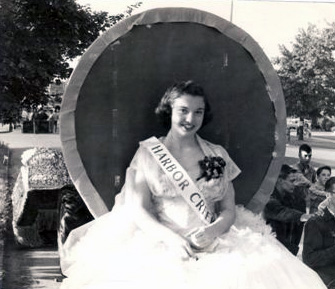
The Harborcreek Future Farmers of America, 1955-1958: A Brief Overview of Its Operational Structure
By Fred Harris
I was accepted into the Harborcreek Chapter of the Future Farmers of America (F. F. A.) in the fall of 1955, and so began an experience that would provide me with a base that I would find myself drawing on throughout out a life time.
Vocational Agriculture at Harborcreek High at that time was taught by William Ellwood. Time would show us that he was a fair and knowledgeable man and teacher. He well understood young boys, and was more than willing to tolerate their shenanigans; as long as they did not get out of hand. He had respect for all of “his” boys. They, in turn, respected and trusted him.
A Vo. Ag. student was required to carry at least one agricultural orientated project, then each succeeding year the student was required to add at least one additional project, so that in the fourth year one would have at least four active projects.
A typical class ran two periods – one usually of classroom theory, and one of farm shop or field trips. While most students had to move from class to class within the confines of the school building each day, we got to walk outside to get to our class ( which was held in the annex); and then once there, who knew where we’d end up.
There were three degrees of chapter membership in the Harborcreek Chapter of the Future Farmers; Green Hand, Chapter Farmer, and State farmer. The fall of “55” saw myself as well as 11 other classmates initiated into Green Hand. After the last of the “tests” were passed, we were awarded our bronze Green Hand pin at a solemn ceremony, which in part consisted of sitting on a block of ice and reciting the FFA Creed. A Creed that I, after 55 years, can still remember. I often wonder why.
With the approval of a chosen project, we were given a project record book. In this book we kept all records of our project work, such as hours worked on the project, amount of money expended, types of machinery required and cost involved, as well as comments and observations and any profits/ losses made. Our grades were based in great part on these records and success of goals set.
 Vocational Agriculture class ran all year around, like a farm would, unlike “normal” school class’s that began in September and ended in May. Mr. Ellwood would make unannounced visits to class members to observe our project (s) and answer any questions we may have. He would check our Project Books and make recommendations as to how we might improve our operations. These visits could occur at any time, but usually happened during summer vacation.
Vocational Agriculture class ran all year around, like a farm would, unlike “normal” school class’s that began in September and ended in May. Mr. Ellwood would make unannounced visits to class members to observe our project (s) and answer any questions we may have. He would check our Project Books and make recommendations as to how we might improve our operations. These visits could occur at any time, but usually happened during summer vacation.
Throughout some 40 years of my working career as a hospital planner, I often drew from the teachings of my years in F.F.A.. What, you may ask, did the teaching of farming have to do with helping one in such a profession, or any profession, so removed from the land? The teachings of F.F.A. taught, (and still does) among many other things, (1) work ethics, (2) cooperation with others, (3) hope of progress through ones labor, (4) leadership, (5) respect (for oneself & others), (6)responsibility ( to oneself, family & community) (7) organization, (8) dreams & development of those dreams. Ah…those were the days.
